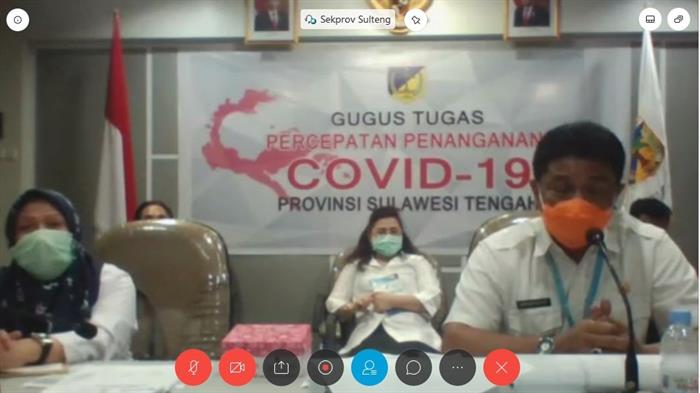Response planning is a critical part of effectively identifying and implementing required activities to have the most benefit. Due to the vast diversity of the Indonesian archipelago, an effective response plan may vary in different regions.
To this end, WHO has been continuously supporting the Ministry of Health to develop provincial COVID-19 response plans for all 34 Indonesian provinces through a series of video consultations. The video consultations ran from 28 May to 10 June 2020; each day consisted of two conferences, with two provinces featured per session.
The video conferences facilitated interactive discussions between central and province levels to systematically review the implementation of response plans to improve COVID-19 activities covering pandemic risk management components including coordination, pharmaceutical interventions, continuity of essential services, risk communications, and surveillance and laboratory operations. Caption: Central Sulawesi province task force presented their COVID-19 response plan in a video conference organized by the MoH and BNPB in collaboration with WHO, on 6 June 2020. Photo Credit: Endang Wulandari/ WHO
Caption: Central Sulawesi province task force presented their COVID-19 response plan in a video conference organized by the MoH and BNPB in collaboration with WHO, on 6 June 2020. Photo Credit: Endang Wulandari/ WHO
The provinces presented their respective response plans and highlighted gaps and challenges experienced in the field. The MoH and National Disaster Agency provided input to help the provinces improve their response planning by addressing the identified gaps and challenges.
There were lessons learned and best practices shared by each province that can be adopted to other provinces. Some key innovations were also identified:
- In Central Java, “Joko Tonggo” uses local wisdom as solidarity within the community to help each other prevent starvation during COVID-19 pandemic.
- In DI Yogyakarta, local wisdom “Lajon/ Boro” monitors community compliance to physical distancing requirements.
- In South Kalimantan, introduction of Kampung Tangguh, village level community enforcement of basic COVID-19 prevention measures
- In Bangka Belitung, the use of a contact monitoring phone application that alerts the community task force of contact breaches to ensure compliance of 14-day self-isolation for contacts of COVID-19 patients.
- In South Sulawesi, asymptomatic contacts of confirmed COVID-19 cases participate in a 14-day quarantine programme, during which they are provided with COVID-19 prevention training and education that they can then share with their communities once the quarantine period is completed. This is known as the Duta COVID-19 (COVID-19 Ambassador) programme.
Other innovations included collaborations with animal health laboratories, BPOM (Food and Drug Agency) and university and hospital laboratories. The involvement of academic and private sectors to support COVID-19 pandemic response and cross-sectoral partnerships to enhance contact tracing, community empowerment activities and the distribution of relevant COVID-19 information, education and communication materials were also identified as largely successful.
Some provinces shared their struggles with limited human resources for case management and contact tracing and inadequate supplies of Personal Protective Equipment (PPE). In particular, provinces with hard-to-reach areas reported struggling to conduct contact tracing and have faced difficulties with transporting specimens and commodity packages.
During the meetings, the Ministry of Health and National Disaster Agency (BNPB) reiterated the importance of monitoring operational response plan implementation and importance of periodically reviewing operational response.
WHO conveyed the updated ‘Operational planning guidance to support country preparedness and response’, released on 22 May 2020. WHO also provided technical inputs on the criteria for adjusting public health and social measures (PHSM) in the context of COVID-19. The criteria covered indicators for epidemiology, health systems and public health surveillance. These can be used to periodically monitor the impact of interventions at all levels.
WHO also encouraged each province to periodically monitor the implementation of the COVID-19 response plans at all levels, involving a whole of society approach. Increasing laboratory capacity, contact tracing, and improving completeness and timeliness of reports is crucial for data analysis and risk assessment to guide the response at all levels. Reviews of health infrastructure, commodity package and human resource mapping and forecasting for essential commodity package, beds, intensive care units and human resources should also be done periodically to anticipate surge needs.
The provinces were reminded that addressing stigma, misinformation, rumor management and large-scale community engagement for social and behavior change are essential to increase community participation in COVID-19 response, and ultimately have the greatest impact.
Provinces that share borders with neighbouring countries, such as Papua, East Nusa Tenggara and West Kalimantan, should also consider cross border collaboration in their plans.
All 34 provinces will now finalise their provincial response plans with these recommendations in mind. The plans will then be disseminated and shared with all involved sectors, including key partners, in order to quickly identify successes and address gaps within the national COVID-19 response in Indonesia.
Main thumbnail caption: Video conference on COVID-19 Response Planning with Riau province Task Force on 8 June 2020. Photo Credit: Endang Wulandari/ WHO
